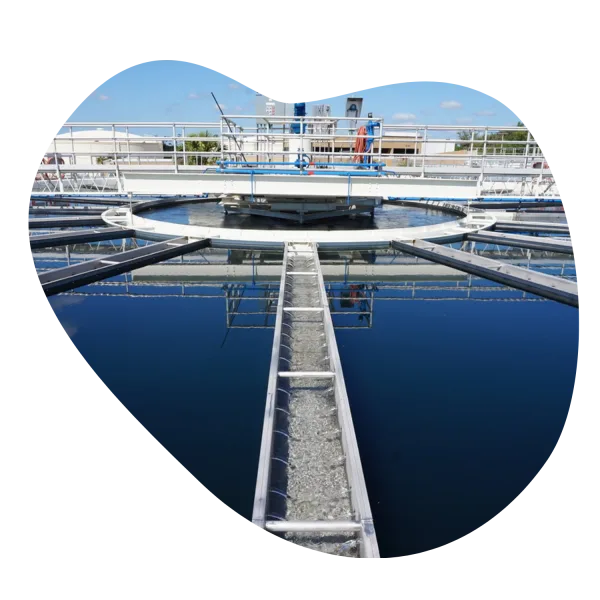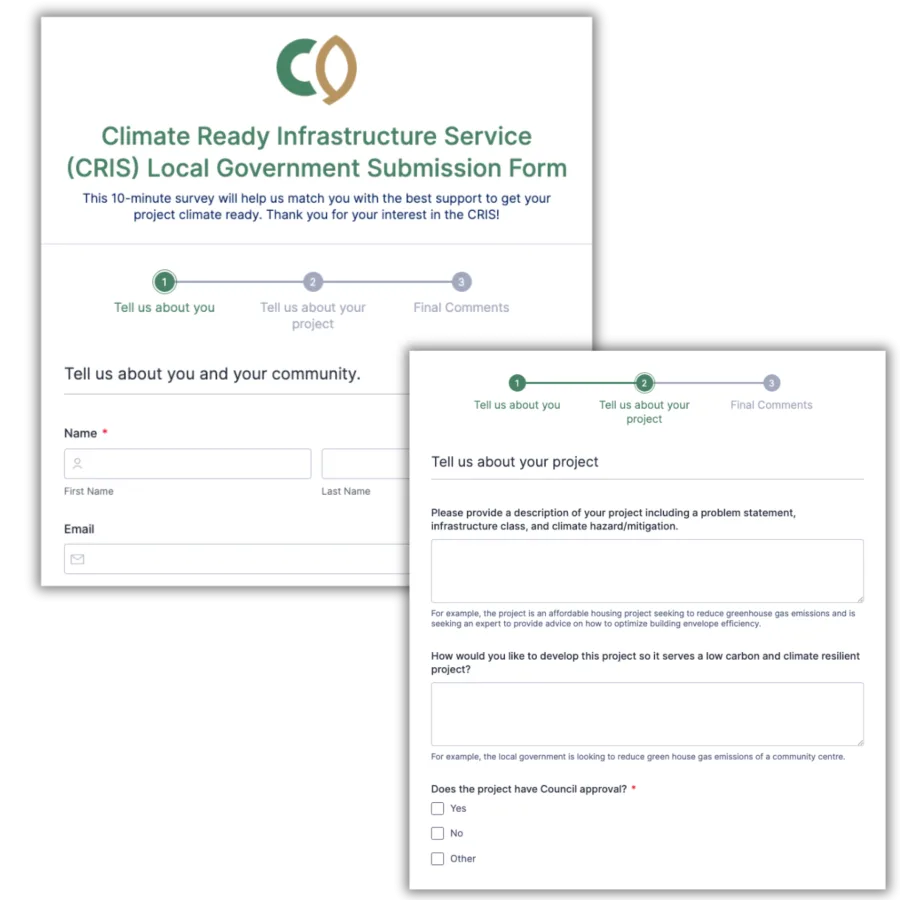How to Register Your Project
The Climate Ready Infrastructure Service (CRIS) can connect your community with expert guidance for long term cost savings, resilience, and sustainability. This page will guide you through the simple steps to register for support.

Ready to get started?
Submit an ongoing or planned public infrastructure project to receive free expert consultation from a member of our Roster and a Technical Options Report with practical, cost-efficient low carbon climate resilience measures tailored to your community. Indigenous Governing Bodies, First Nation, Inuit or Metis government or authorities, municipalities, and local governments from across Canada with populations of under or around 30, 000 inhabitants are eligible for this service.
Eligibility:
- Your community has a population of approximately 30,000 or less, or your housing or infrastructure serves communities with populations of approximately 30,000 or less.
- You have a planned or ongoing public infrastructure or housing project.
- Your project is included in a multi-year capital plan, has Council approval, or is formally endorsed by a senior decision-making authority (e.g., CAO, band council, housing board of directors).
Ready to register your project? Click the button below to fill out our simple, 15-minute submission form.
3 Step Registration Guide
1. Verify Your Eligibility
Eligible Asset classes:
- Bridges, Major Culverts, and Dams
- Coastal Shoreline Management
- Engineered Wetlands and Marshes
- Fire and Emergency Facilities
- Fleets
- Green Infrastructure and Nature Based Solutions
- Heavy Equipment
- Housing
- Municipal Buildings and Facilities
- Parks and Trails
- Potable Water Treatment and Distribution Systems
- Roads, Sidewalks, and Active Transportation
- Solid Waste, Landfills, and Incinerators
- Sports Facilities
- Stormwater Management Systems
- Transit (including buses)
- Wastewater Treatment Facilities
2. Prepare Your Registration
Here’s a quick look at the basic information you'll need to fill out the online form. This will help us understand your project, your goals, and how we can best support your team.
- About You and Your Community: Your name, contact details, local government name, province/territory, and community population.
- About Your Team: Who’s involved, what departments are participating, your team size, and whether you’ve identified a climate expert or need help finding one.
- Your Project Overview: A description of the project, its current phase, approval status, estimated cost, funding, and how it fits into capital or strategic plans.
- Climate Lens: How the project addresses climate change, including climate hazards, emissions reduction strategies and any risk assessments completed (like using the Climate Insight tool from the Climate Toolkit).
- Timing & Readiness: When you need support, construction timelines, and what work has already been done.

3. Use the Climate Insight Tool
To strengthen your submission to the CRIS, use the Climate Insight Tool from ICLEI to discover how an expert can support your project.
Climate Insight is a free online platform that empowers communities across Canada with the data and information needed to build low-carbon, resilient housing and infrastructure. Climate Insight is designed to meet the needs of housing and infrastructure professionals, and is a key resource for communities feeling the impacts of aging infrastructure and increasing climate risk. With user feedback at the heart of the process, the platform’s functionality, features, and content is continuously being updated to better serve communities as they confront the growing challenges of climate change.

Register Now!
If you've reviewed the steps and prepared your information, you're all set! Click the link below to start your online registration—it’s simple, quick, and the first step toward getting expert support for your infrastructure project. You don't need to have everything finalized, but the more information you can share, the better we can match you with our Roster of Climate and Infrastructure Experts.
What to expect after you register
Still Have Questions?
Tune into our past virtual Information Session to get an overview of how the service works, hear first-hand from project participants, and watch a Q&A with our team.
Register for our newsletter to be the first to hear about upcoming events and webinars:
The CRIS is designed to support governments in building infrastructure that’s ready for a changing climate—but we know every project is unique. Our Frequently Asked Questions (FAQ) section offers detailed information about how the CRIS service works, what kinds of support are available, and how to get started. Whether you're in early planning or ready to implement, you'll find answers to help you make the most of what the CRIS offers.
"The application process was seamless: it was very easy and very straightforward, and the CRIS team got back to me very quickly."
-Mohammed Awojobi
Corporate Climate Initiatives Coordinator | Climate and Energy – Public Works Department, County of Dufferin
"The results [of the CRIS project] provided clarity and prioritization for our Board and staff on how best to use our limited resources."
-Mark Boysen
Chief Administrative Officer, North Salt Spring Waterworks District

